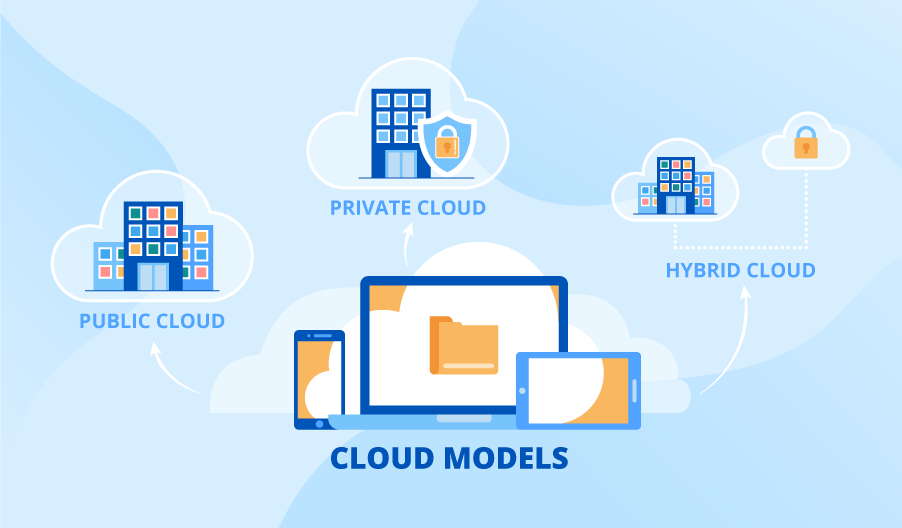Are Cloud Computing Solutions Worth Implementing?
Editor’s note: In this article, Sergey tells about cloud computing solutions, their various models and deployment types, as well as the benefits they can bring to the businesses. If you consider creating a cloud app for your business, feel free to check out ScienceSoft’s cloud app development offer.
Cloud computing is booming today, with the global cloud computing market expected to reach $623 billion by 2023.
The majority of IT companies already favor cloud apps more than on-premises ones, while non-IT organizations start to share that feeling as well. And ScienceSoft’s software development experience proves this trend: more than 80% of our software development projects use cloud technologies.
In this article, I’d like to share the insights on options you have while developing and deploying cloud applications and what benefits you can achieve using cloud solutions in your business.

Public, Private or Hybrid — That’s the Deployment Question
Public cloud
With the public cloud, a cloud service provider (such as AWS, Microsoft Azure or Google Cloud Platform among the most popular ones) offers resources, such as storage, monitoring capabilities, and networking capacities, or virtual machines, to multiple customers on a subscription basis or a pay-per-usage model.
When you use the public cloud, its provider is responsible for the management and maintenance of cloud servers, storage, virtual machines, and other resources.
Sometimes, public clouds are associated with insecurity and inflexibility due to their multi-tenant nature. However, the right tenant isolation makes public clouds flexible and secure, even for the most valuable information.
Private cloud
The main idea of a private cloud is that it is used exclusively by one company.
One of the benefits of using a private cloud is a high security level, which is ensured by employing a secure firewall system and hosting the cloud within an isolated network.
However, if you’re a small or mid-sized business and don’t have a huge budget, creating a private cloud for deploying your solutions may be too expensive for you. The costs are definitely higher than deploying in a public cloud, as all management, maintenance, and updating of data centers, hardware and software lie on your in-house team. But you can make this burden easier on your team by using such services as provided, for example, by HPE GreenLake that delivers hardware capacity on-demand with pay-per-use billing.
Hybrid cloud
Hybrid cloud offers a mix of public cloud and private cloud services. Hybrid cloud deployments allow those services that do not need to be on-premises (e.g., due to data security requirements) to be deployed in the cloud with all its advantages. Compared to the public cloud, this cloud type gives you more agility as you don’t fully depend on third-party providers. Hybrid cloud provides you with a unique approach to data security as you can both store your data in a private isolated environment and use the public cloud for data backup and recovery measures.
The main challenge of this deployment type is the need to ensure stable connection and smooth data transfer between the private and the public clouds.
IaaS, PaaS, SaaS, FaaS: What Are They For?
IaaS
Infrastructure as a Service (IaaS) provides companies with an infrastructure to develop their applications in the cloud. This type of cloud computing services offers you such resources as virtual machines, storage, and network services.
With IaaS, companies avoid huge capital expenditures as they pay only for the resources they use. Another strong advantage is that you can get any resources needed in just a few clicks by purchasing a required infrastructure element. Thus, by choosing IaaS, you can launch your cloud app fast.
PaaS
By choosing Platform as a Service (PaaS), besides cloud storage and other resources, like operating systems, you get ready-to-use tools for developing, configuring, customizing, testing, and managing your applications. Such tools can be, for instance, database, application integration, or AI services.
The PaaS model is popular with companies as it cuts the coding time, reduces time to market, and the overall software development expenses.
Serverless
The serverless model allows for quick development and easy scaling as, naturally, there is no reliance on virtual machines since the cloud executes application code without the need to install anything.
Serverless deployment is financially efficient as a cloud provider charges for the exact compute resources needed to execute your code, not for the number of the virtual machines. Maintenance costs are also pretty low.
SaaS
In the SaaS (Software as a Service) model, software is used on a subscription basis and centrally hosted in the public cloud. The companies don’t need to build anything from scratch but can find a pre-built solution that can be configured and customized to meet their needs fully.
SaaS solutions cover a wide variety of business needs, such as marketing, accounting, sales, HR, etc. Popular examples of SaaS products are Salesforce, Microsoft Dynamics 365 Online, and Office 365.
Why Do Companies Choose Cloud Computing Solutions?
Scalability
One of the great benefits of cloud hosting is autoscaling. It means that the number of cloud virtual machines automatically changes depending on the load. However, you need to be careful not to pay for the resources you never used or for using more than you actually needed.
ScienceSoft’s experience proves that autoscaling works great for businesses. Our team has developed a billing-as-a-service (BaaS) solution for international payment processing. They created a highly scalable solution that automatically scales from using 2 to 50 app servers depending on the load. This helped to make the inherently scalable, sustainable, and auditable billing system.
Cost-effectiveness
Cloud computing makes app development faster due to the use of cloud services instead of writing custom code, thus allowing fewer human and financial resources to be used. Moving to the cloud helps manage the applications more efficiently and reducing maintenance costs. There is no need to maintain hardware or buy additional equipment when the business starts to grow.
Access to advanced technologies
Besides continuously working on introducing new services to their offering, cloud service providers already deliver a wide range of services based on cutting-edge technologies such as AR/VR, blockchain, machine learning, and IoT. For example, Azure offers Machine Learning Studio (predictive analytics technology), while AWS provides Amazon SageMaker tool for quick machine learning model deployment.
Choose Cloud Computing for Your Project
Cloud computing solutions can become highly beneficial for your business. However, you shouldn’t underestimate the knowledge and competences needed to deliver and implement such a solution. Your team needs to be proficient in DevOps, know how to work with AWS, Azure or Google Cloud Platform, and establish ample cybersecurity measures.
If you don’t have an in-house team with such competences, just leave a note for ScienceSoft’s team.


